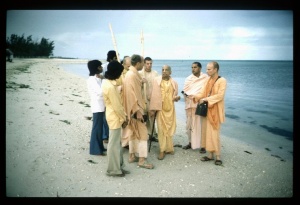SB 11.24.8: Difference between revisions
m (1 revision(s)) |
(Vanibot #0017 edit: indent verse and change id='' to class='' for SB) |
||
| Line 1: | Line 1: | ||
{{info | {{info | ||
|speaker=Lord | |speaker=Lord Kṛṣṇa the Supreme Personality of Godhead | ||
|listener=Uddhava | |listener=Uddhava | ||
}} | }} | ||
[[Category:Srimad-Bhagavatam - Canto 11 Chapter 24|s08]] | |||
[[Category:Bhagavatam Verses Spoken by Lord Krsna - Vanisource|112408]] | |||
<div style="float:left">'''[[Srimad-Bhagavatam]] - [[SB 11|Eleventh Canto]] - [[SB 11.24: The Philosophy of Sankhya|Chapter 24: The Philosophy of Sāńkhya]]'''</div> | |||
<div style="float:right">[[File:Go-previous.png|link=SB 11.24.7]] '''[[SB 11.24.7]] - [[SB 11.24.9]]''' [[File:Go-next.png|link=SB 11.24.9]]</div> | |||
{{RandomImage}} | |||
{{SBnotice}} | |||
==== TEXT 8 ==== | ==== TEXT 8 ==== | ||
<div | <div class="verse"> | ||
arthas tan-mātrikāj jajñe | :arthas tan-mātrikāj jajñe | ||
tāmasād indriyāṇi ca | :tāmasād indriyāṇi ca | ||
taijasād devatā āsann | :taijasād devatā āsann | ||
ekādaśa ca vaikṛtāt | :ekādaśa ca vaikṛtāt | ||
</div> | </div> | ||
| Line 17: | Line 22: | ||
==== SYNONYMS ==== | ==== SYNONYMS ==== | ||
<div | <div class="synonyms"> | ||
arthaḥ—the gross elements; tat-mātrikāt—from the subtle sensations (which themselves are derived from false ego in the mode of goodness); jajñe—became generated; tāmasāt—from false ego in the mode of ignorance; indriyāṇi—the senses; ca—and; taijasāt—from false ego in the mode of passion; devatāḥ—the demigods; āsan—arose; ekādaśa—eleven; ca—and; vaikṛtāt—from false ego in the mode of goodness. | arthaḥ—the gross elements; tat-mātrikāt—from the subtle sensations (which themselves are derived from false ego in the mode of goodness); jajñe—became generated; tāmasāt—from false ego in the mode of ignorance; indriyāṇi—the senses; ca—and; taijasāt—from false ego in the mode of passion; devatāḥ—the demigods; āsan—arose; ekādaśa—eleven; ca—and; vaikṛtāt—from false ego in the mode of goodness. | ||
</div> | </div> | ||
{{SBcollapse}} | |||
==== TRANSLATION ==== | ==== TRANSLATION ==== | ||
<div | <div class="translation"> | ||
From false ego in the mode of ignorance came the subtle physical perceptions, from which the gross elements were generated. From false ego in the mode of passion came the senses, and from false ego in the mode of goodness arose the eleven demigods. | From false ego in the mode of ignorance came the subtle physical perceptions, from which the gross elements were generated. From false ego in the mode of passion came the senses, and from false ego in the mode of goodness arose the eleven demigods. | ||
</div> | </div> | ||
| Line 31: | Line 36: | ||
==== PURPORT ==== | ==== PURPORT ==== | ||
<div | <div class="purport"> | ||
From false ego in the mode of ignorance, sound is generated along with the sense of hearing to receive it and the sky as its medium. Next, the sensation of touch, air and the sense of touch are generated, and thus from subtle to gross all of the elements and their perceptions are generated. The senses, because they are busily engaged in activity, are created from false ego in the mode of passion. From false ego in goodness come eleven demigods: the deities of the directions, the wind and the sun, Varuṇa, the Aśvinī deities, Agni, Indra, Upendra, Mitra, Brahmā and Candra. | From false ego in the mode of ignorance, sound is generated along with the sense of hearing to receive it and the sky as its medium. Next, the sensation of touch, air and the sense of touch are generated, and thus from subtle to gross all of the elements and their perceptions are generated. The senses, because they are busily engaged in activity, are created from false ego in the mode of passion. From false ego in goodness come eleven demigods: the deities of the directions, the wind and the sun, Varuṇa, the Aśvinī deities, Agni, Indra, Upendra, Mitra, Brahmā and Candra. | ||
</div> | </div> | ||
__NOTOC__ | </div> | ||
</div> | |||
<div style="float:right">[[File:Go-previous.png|link=SB 11.24.7]] '''[[SB 11.24.7]] - [[SB 11.24.9]]''' [[File:Go-next.png|link=SB 11.24.9]]</div> | |||
__NOTOC__ | |||
__NOEDITSECTION__ | |||
Revision as of 06:16, 30 November 2017

A.C. Bhaktivedanta Swami Prabhupada
Please note: The synonyms, translation and purport of this verse were composed by disciples of Śrīla Prabhupāda
TEXT 8
- arthas tan-mātrikāj jajñe
- tāmasād indriyāṇi ca
- taijasād devatā āsann
- ekādaśa ca vaikṛtāt
SYNONYMS
arthaḥ—the gross elements; tat-mātrikāt—from the subtle sensations (which themselves are derived from false ego in the mode of goodness); jajñe—became generated; tāmasāt—from false ego in the mode of ignorance; indriyāṇi—the senses; ca—and; taijasāt—from false ego in the mode of passion; devatāḥ—the demigods; āsan—arose; ekādaśa—eleven; ca—and; vaikṛtāt—from false ego in the mode of goodness.
Translation and purport composed by disciples of Śrīla Prabhupāda
TRANSLATION
From false ego in the mode of ignorance came the subtle physical perceptions, from which the gross elements were generated. From false ego in the mode of passion came the senses, and from false ego in the mode of goodness arose the eleven demigods.
PURPORT
From false ego in the mode of ignorance, sound is generated along with the sense of hearing to receive it and the sky as its medium. Next, the sensation of touch, air and the sense of touch are generated, and thus from subtle to gross all of the elements and their perceptions are generated. The senses, because they are busily engaged in activity, are created from false ego in the mode of passion. From false ego in goodness come eleven demigods: the deities of the directions, the wind and the sun, Varuṇa, the Aśvinī deities, Agni, Indra, Upendra, Mitra, Brahmā and Candra.